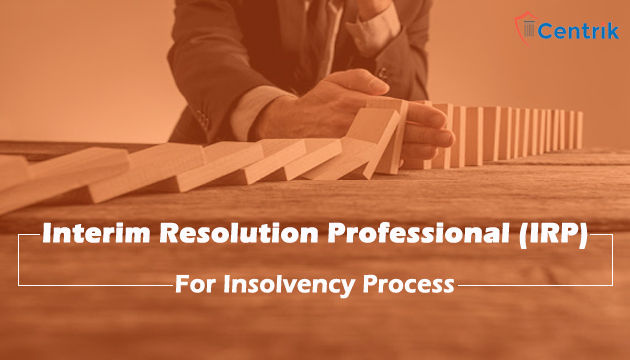
Status as on- 22/09/2020
The Insolvency and the Bankruptcy Code, 2016 [“IBC”] was enforced with a major aim of restructuring, reviving and providing time bound resolution to insolvent companies. This was done to maximize the value of assets and to promote entrepreneurship. Under the IBC, it is open to either a Financial Creditor under Section 7 or an operational Creditor under Section 9 to file a petition against a defaulting Corporate Debtor before the National Company Law Tribunal [“NCLT”] praying for the initiation of Corporate Insolvency Resolution Process [“CIRP”] against the Corporate Debtor.
The CIRP, as the name suggests is a very complex and demanding process, which can be handled by only specialized professionals. These special professionals are known as the Interim Resolution Professionals [“IRPs”] who are accredited under the Insolvency and Bankruptcy Board of India [“IBBI”].
Once the NCLT admits a petition filed by either a Financial or Operational Creditor, the CIRP begins against the Corporate Debtor. Upon the commencement of the CIRP, the management of the Corporate Debtor, including its Director(s), is dismissed and the IRP sits in the position of the CEO of the Corporate Debtor and takes over the control of the Company. Further, the IRP constitutes the Committee of Creditors [“CoC”], who then decide and vote upon the fate of the company and it is upon their actions & voting only that the IRP acts for the revival of the Company. Therefore, it becomes very crucial to determine who you should appoint as your IRP who will further act upon the majority directions of the Committee of Creditors, for a company which is a sinking ship.
The IBBI, which is a regulatory authority of all the IRP/RP, has laid down certain requirements which should be fulfilled by the resolution professionals before being appointed as IRP/RP of any company. Therefore, before choosing an IRP, one must take into consideration the following points:
- There should be no disciplinary proceedings pending against the IRP, whether initiated by the IBBI or the Insolvency Professional Agency of which he is a member.
- The IRP should not have been convicted by any competent court of law, at any time in the last three years.
- The IRP should express his interest to be included as the IRP/RP for the relevant period.
- The IRP undertakes to discharge the responsibility as IRP or Liquidator.
- The IRP should be registered with the Board as an insolvency professional.
- The IRP should have experience in the relevant industry to handle the business and other related matters
- The IRP should have a good team backup with experience for claim verification, IM and other related matters.
- The IRP should be a full time professional in practice. Generally, the professionals having long standing practice handle a variety of work which make him good IRP to handle the assignments.
In addition to above requisites for an IRP to be appointed for a corporate debtor, the Committee of creditor should also look into the factor like how many projects the concerned IRP has dealt with, or in the kind of industries the IRP has dealt with.
Conclusion- In view of the above it can be inferred that an Insolvency Professional having all the aforementioned requirements may be chosen as an IRP for the corporate debtor. However it may have an advantage over other IRP if the person had already dealt in that specific industry being an RP/IRP.
Disclaimer- The above article is based on the interpretation of the related laws and judicial pronouncements. The readers are expected to take legal advice before relying on this article. The author can be reached at support@centrik.in or call the IP expert at 8383011629




 join For Updates
join For Updates